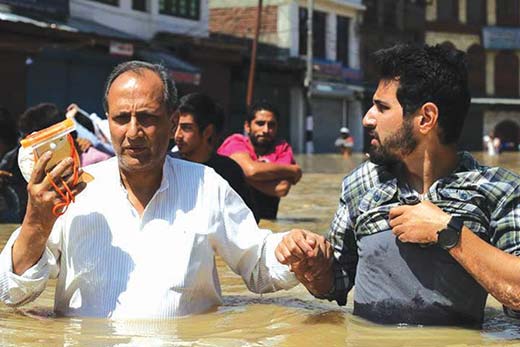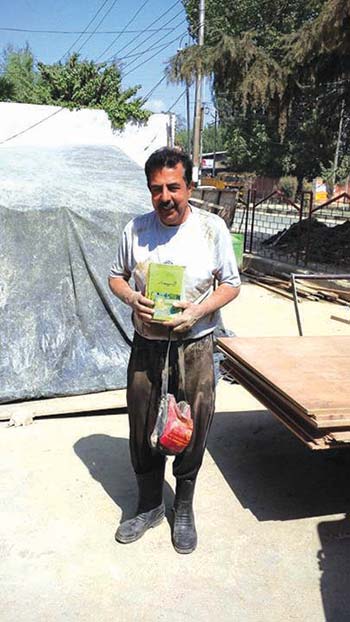In 2014 September floods, hundreds of people lost their rare objects, books and documents. While the collective flood loss was historic, the personal loss was equally colossal. Bilal Handoo reports how the deluge devoured personal collections of a lifetime

A week after September floods hit Srinagar, valley’s ace journalist, Yusuf Jameel waded in knee-deep waters to enter his office in Srinagar’s Press Enclave. But the moment he stepped in, he could see his rare reports, documents, clippings and books turned into the muck.
For the man who broke the news of Kunan Poshpora gang-rape incident of February 1991, the sight of slush — that used to be his proud personal collection till September 6, 2014 — was simply heart-breaking.
“Among those books,” he said, “some were rare.” Along with his books, his exclusive reports on Kashmir conflict had vanished too. But the major setback for the scribe was the loss of his documents he needed for his book on Kashmir. “Things won’t be the same again,” he said. “Now, I have to rely on memory to write about those events.”
However, the veteran journalist wasn’t alone who lost his personal collection to floods.
In the nearby college of education, the same sense of loss ran high after the floodwater receded. The college library housed some 50,000 books before floods. Sumaiya Sadiq, the chief librarian said the college library was packed with books, some of them rare, Rabindranath Tagore’s paintings, visitor’s books since the 1940s and other rare things. “Most of the collection suffered irreparable damage in floods,” she said.
Those working at the Jammu and Kashmir Academy of Culture and Arts were quick to realise that the flood had done irreparable loss to the treasure trove kept inside the Academy. As the post-flood scrutiny began, it was known that 90 manuscripts of the sixth century have suffered “irreparable damage” inside the Academy premises. Besides, publications since 1958 were badly stained.
Srinagar’s Information Department too suffered the irreparable loss to its archives. Historic paper-cutting piled in 1600 files got badly damaged. “Those weren’t just files,” said an information official, wishing anonymity, “they were rare documents on Kashmir history.”
The official said the departmental archives won’t be the same again. “Among those paper-cutting were some rare reports, analysis and commentary pieces on Kashmir history since 1947,” the official said. “It is a huge loss.”
Apart from departmental collections, individuals like Majeed Zargar, a chartered accountant cum columnist could salvage only a handful of books in his personal collection. “I had some rare books on Kashmir history among my collection,” Zargar said. “But flood devoured everything.”
An image showing Zargar posing for a camera, holding his only salvage the “Shahabnama”, became viral on social networking sites soon after the September floods. “Fortunately later I retrieved six more books, partially damaged in floods,” he said. “Rest, I lost everything.”
With houses felling like a pack of cards in last fall, something too precious inside them was also getting lost. One such house was that of the celebrated poet of Kashmir — Agha Shahid Ali, who died in 2001 at 52.

As Jhelum receded, the poet’s house had literally become a graveyard of his personal collection. Some rare books were turned into a wasted pile. Among a few salvaged things was a postcard with a picture of Princess Diana.
At a short distance from the poet’s ravaged address, valley’s prominent artist, Masood Hussain could only salvage his seven paintings based on poet Shahid Ali’s seven unpublished couplets, given to him by the poet 16 years ago.
Apart from devouring personal collections of some public figures and departments, floods also devoured hundreds of rare collections of commoners.
One such commoner is Sultan Bhat — a photographer by passion. He lost some of the rare pictures he had clicked since the sixties. Among his collection was some rare shots of Sheikh Abdullah addressing and meeting people at National Conference’s erstwhile headquarters, Mujahid Manzil in the old city. “Some rare photographs of slain militants were also there,” Sultan said.
On September 6, when Jhelum started flooding his residence at Srinagar’s Raj bagh, Sultan left everything behind and ran with his family. Once he was back, his prized possession had turned into slush.
It took Samad Shah almost a lifetime to collect and pool a variety of coins of different eras. This sixty plus something retired government employee of Srinagar had among his collection some coins of Sikh and Dogra era, besides some rare foreign banknotes.
But it took Jhelum a few hours to wash away all his collection kept at his Jawahar Nagar residence. “My house collapsed during floods,” Shah said. “With the result, I could hardly salvage anything.”
Back to Srinagar’s Press Enclave where journalist Yusuf Jameel’s official residence was getting a facelift. Amid this renewal, the ace scribe said: “Rebuilding in certain cases isn’t possible.”
The veteran is right. Even the government couldn’t estimate the cost of personal collections lost in the deluge, implying, not everything can be tagged with a price tag.















